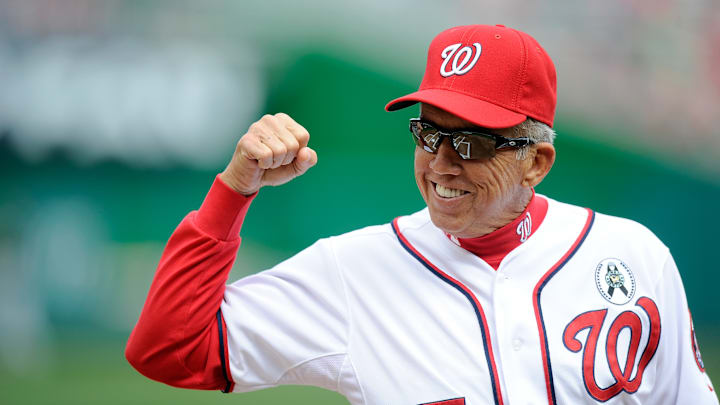Former Washington Nationals Manager of the Year honoree Davey Johnson passed away at age 82, New York Mets PR representative Jay Horwitz announced earlier this week.
Johnson's tenure with the Washington Nationals organization was short, but he left a lasting impact. Joining the team's front office as a consultant in 2006, Davey became the team's interim manager in 2011 after the outspoken Jim Riggleman resigned. While also earning a mathematics degree from Trinity University at the same time, Johnson returned to manage the 2012 team, taking the helm and righting the ship en route to the Nationals' first-ever winning season. The team won 98 games that year, a franchise record dating back even to the team's days in Montréal that still stands today. The team would lose the NLDS to the St. Louis Cardinals in heartbreaking fashion, being leapfrogged with a two-run lead in the ninth inning of a winner-take-all Game 5 by a team that would go the distance with the eventual World Series-champion Giants in the Championship Series.
That level of impact certainly cannot be understated, though; Johnson steered the team to its first ever playoff berth, let alone division title, and took home Manager of the Year honors in the process. The team won 86 games under his guidance the next year, marking the 13th time Johnson managed a team to 85 wins or more in a full season over the course of his career. The Nationals would miss a Wild Card berth by 4 games in that 2013 campaign, but Johnson kickstarted a run of eight consecutive winning seasons, each of which saw the Nationals draw over 2.2 million fans to Nationals Park.
Davey Johnson's managerial career is only underscored by his incredible successful Major League playing career. A 13-year veteran, Johnson debuted for the Baltimore Orioles on April 13, 1965, before finishing third in the American League Rookie of the Year vote the next season. Over the next six years, Johnson would make three All-Star teams with the Orioles while also winning three Gold Gloves as a second baseman. He received MVP votes for the first time in 1971 before going on to win another make another All-Star team with the Atlanta Braves in 1973.
Johnson's career was not without Postseason success, either. As a player he was a World Series champion twice with the Orioles, going ballistic in the 1970 American League Championship Series to the tune of a 1.371 OPS, homering twice in 12 plate appearances and driving in four before batting .313 in that year's World Series.
Johnson also went on to spend two seasons in Japan's top league, Nippon Professional Baseball, and posted a .904 OPS with 26 home runs in 1976 for the Tokyo-based Yomiuri Giants. Gaijin Baseball, a prominent English-speaking Japanese baseball-focused Twitter account, notes that Johnson, the Giants' first ever non-Asian position player, was in the hole when both Hank Aaron and Sadaharu Oh hit their respective 715th career home runs, both passing Babe Ruth on the all-time top-level home runs list.
Johnson joined the New York Mets as a manager in 1984, leading the team to 90 wins in five consecutive seasons and dominating MLB in 1986 when his Mets won 108 games en route to a World Series championship. No other team in MLB would win that many games again until the Yankees won 114 in 1998. His 595 managerial wins in Queens remain the most in Mets franchise history to date.
Johnson would go on to manage the Reds, Orioles, and Dodgers in the decade following his dismissal from the Mets in 1990, winning 98 games with the Orioles in 1997 and being awarded American League Manager of the Year honors before departing the team due to a conflict with then-owner Peter Angelos. Johnson also managed Team USA in the 2006 and 2009 editions of the World Baseball Classic, as well as the 2008 Summer Olympics in Beijing. Among MLB managers with at least 1,000 wins, Johnson ranks tenth all-time in winning percentage. Every manager ahead of him on that list is in the Baseball Hall of Fame.
Bruce Weber of the New York Times reports that Johnson is survived by his wife Susan; his children, David and Dawn; and his stepchildren Ellie and Jeremiah.
The vast majority of statistical information in this piece was sourced from Baseball-Reference, at https://www.baseball-reference.com.
